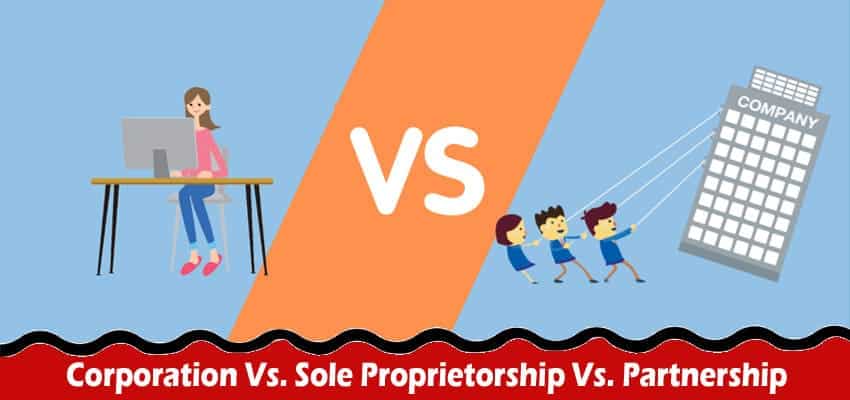Introduction
If you’re just starting a business, it’s highly likely that you are focusing more on the structure than anything else. After all, it’s the thing that’ll make your business either a pass or a failure.
I mean, your business structure might potentially affect your corporation’s legal risks, growth prospects, and profits. So, it’s important that you choose your business’ structure carefully.
But, the question here is – which option should you go for?
When talking about the types of organizational structure, most people tend to choose any one between the following three –
- Sole proprietorship
- Corporation
- Partnership
Now, each of these three are quite different from one another and bring something unique to the table. So, let’s learn more about them before making a decision.
Sole-Proprietorship: A Grand “One-Man” Show
Let’s start with the simplest one – Sole Proprietorship. This is like being the captain of your own ship. You’re the boss, the decision-maker, and the hard worker all rolled into one.
It’s just you running the show.
You’ll have complete control, which is great. However, it also means all the responsibilities and risks fall squarely on your shoulders. Let’s take a look at both sides of the coin.
The Upsides
- You don’t need to fill out a ton of paperwork or go through a lot of legal hoops. In this case, all you need to do is have enough money to open up a shop. That’s all. After that you can begin operating the same without any limitation at all.
- You’ll make all the decisions, from the products or services you offer to how you run the business. So, if something goes right, you will get all of the credit eventually.
The Downsides
- It means your personal assets (like your car or house) may be on the line if something goes wrong with the business. You might end up losing the entire organization too.
- It might be harder to get big loans or attract investors, because it’s just you. In order to get someone’s attention, you must market properly and show your market potential.
Partnership: Teaming Up for Success
Now, let’s talk about Partnerships.
This is like running a business with a buddy. It’s when two or more people join forces to run a company in Singapore together. Like a team, you share the responsibilities and rewards.
The Upside
- You’re not alone in making decisions. You have someone to brainstorm with and share the workload. So,
- With more people involved, you can pool more money, skills, and connections. Also, as you have a partner, it will also become easier to manage all of them.
The Downside
- You’ll have to split the profits with your partners. So, basically, you will get a much, much smaller piece of the pie. And, in some cases, it might not even be worth it.
- If you and your partner(s) don’t agree on something, it can lead to disagreements. And that, in turn, might turn out to be a lot of work if the argument isn’t cleared soon.
Corporation: Big Business, Big Structure
Finally, we have the Corporation.
Think of this as the big leagues. It’s kinda like a separate legal entity from its owners (called shareholders). It’s a bit more complex to set up, but it can offer some serious advantages.
The Upside
- Your personal assets are usually protected. If the business somehow gets into trouble, it’s the corporation’s problem, not yours. Basically, you will not be in any trouble at all, as long as you are not involved in any illegal tasks.
- Selling shares of stock is a common way to raise funds, which can be used to grow the business. It’s quite a future-proof strategy as well, so there’s no need to worry.
The Downside
- There’s more legal stuff to take care of, like annual reports and meetings. So you’ll have to participate in a lot of official tasks, unlike a partnership.
- Shareholders have a say in major decisions, so you might not have complete control. I don’t think this is a trait most ambitious people would like.
Which One Should You Go for, Then?
It really depends on what you’re looking for. If you want total control and don’t mind taking on the risks, Sole Proprietorship might be your jam.
If you like the idea of sharing responsibilities and resources, Partnership could be a great fit. And if you’re dreaming of a big, separate entity with limited liability, a Corporation might be the way to go. Remember, there’s no one-size-fits-all answer.
Each business structure has its pros and cons. So, take some time to think about your goals, your resources, and how much control you want.
And, if you are not sure, it’s always a great idea to talk to a lawyer or business advisor. They can help guide you to the best fit for your unique situation.


